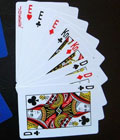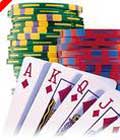赛马就如同找胸大腿细的漂亮女人
有位热衷赛马活动的人说:“在中国赛马就像是找漂亮女人,要挑胸大腿细的。”这句话颇为反映了中国当下的赛马行情。
机会对于中国的小投机商来说少得可怜。因此,最近7000名武汉居民沸沸扬扬,齐聚东方马城赛马场,全情投入在被中央领导人称作的“社会祸害”里。在中国大陆,这是自共产党1949年禁止赌博以来,人们赛马赢钱首获官方批准。
但让经验丰富的赌徒们失望的是,这里没有“堕落”。像这样的话,赌博是不被允许的。赛马场上的观众可以在五场比赛中的两场里,免费选一批马,如果这匹马赢了,选它的观众将会被奖励让他们有机会赢得3万元(4400美元)奖金的20张即开型彩票。一个幸运的中奖者抢先获得了4000元奖金,大部分人刮出的奖金额还不够支付回家的的士费。从四川打飞的过来的强悍观众直在那儿诅咒他们鼓鼓的钱包根本不值几个钱。
11月举行的这场赛事实际上具有试验性,是这个国家博彩市场走向开放迈出的重要一步。同月,世界扑克巡回赛向电视观众介绍了中国扑克,即“拖拉机”。经济疲软的现状让政府不得不考虑放下意识形态差异去追逐经济利益。一位中国研究者声称全国范围内的马彩业将能创造300万个就业机会并带来400亿的税收收入。并且政府还将可能部分挽回每年因非法赌博而造成的大约7000亿元的资金流失。
但需要把共产党的保守派说服才行。他们认为马彩会使老百姓堕落,会动摇社会稳定,是回到殖民统治的大倒退:20世纪早期,往返于长江口岸的英国商人曾在武汉举行赛马。
武汉参与赛马的群体已然发生了变化。一位从教师转行成企业家的现场观众,引用了邓小平的一句至理名言来表明道德讨论没有意义:“不管是黑猫还是白猫,只要抓到老鼠,就是好猫。”其他人则对赛事解说员的建议狂热追捧:选马就像是找漂亮女人(要挑胸大腿细的)。
赛马场的经营者--东方神马集团,归港商吴杰克所有,他得到了中央政府难得的支持--体育局副局长宣布比赛开幕--但被政府的反复无常弄怕了。拥有一个种马场和一套在建的训练设施,吴先生损失惨重(对于在当地大学攻读赛马学位的93名学生来说同样如此)。这个集团曾目睹2005年北京赛马经营由于未经批准的赌博太过火而被关停,一时闹得沸沸扬扬。现在最主要的就是谨慎行事、静观其变。
译文:
OPPORTUNITIES are sparse for China’s small-time speculators. So it was with a certain ebullience that 7 000 residents of Wuhan recently gathered at the Orient Lucky City racecourse to indulge in what the central leadership terms a “social evil”。 They were the first people in mainland China to be given official approval to win money from horse races since the Communist Party outlawed gambling in 1949.
To the disappointment of hardened punters depravity was lacking. No gambling as such was allowed. Racegoers could pick a horse for nothing in two of the five races and if it won were awarded 20 lottery scratch cards giving them the chance to win 30 000 yuan ($4 400)。 One lucky winner scooped 4 000 yuan; most won less than a taxi fare home. The big hitters who had flown in from Sichuan could be heard cursing the impotence of their bulging wallets.
Tentative as it was the race meeting in November was a significant move towards opening the country’s vast betting market. In the same month the World Poker Tour introduced Chinese poker or Tuo La Ji to television viewers. As the economy falters the incentives for the government to trade ideology for profit are compelling. A Chinese researcher has claimed that a nationwide betting industry for horse racing would create 3m jobs and 40 billion yuan in tax revenues. And the government might also rescue some of the estimated $700 billion lost to illegal betting each year.
But the Communist Party’s conservative factions will need persuading. They regard horse-race betting as immoral for the masses a challenge to social stability and a throwback to colonialism: British merchants plying the Yangzi River set up racing in Wuhan in the early 1900s.
Wuhan’s new racing crowd has been converted. One spectator a teacher-turned-entrepreneur trotted out a bit of wisdom from Deng Xiaoping to dismiss the morality debate: “No matter if it is a white cat or a black cat; as long as it can catch mice it is a good cat.” Others enthusiastically followed the advice of the course commentator who compared picking a winning horse to finding a pretty woman (“Look for a big chest and slim waist”)。
The racecourse operator Orient Lucky Horse Group owned by Jacky Wu a Hong Kong businessman enjoys rare central-government backing—the vice-minister of sports opened the meeting—but is terrified by government fickleness. With a stud farm and a training facility under construction Mr Wu has a lot to lose (as do the 93 students who are studying for a degree in horse racing at a local university)。 The group has seen racing operations shut down in the past as unauthorised betting went too far notably in Beijing in 2005. Caution is now its prime policy.
相关推荐
随机专题



 您现在的位置:
您现在的位置: 
 网上扎金花技巧
网上扎金花技巧 二十一点怎么玩?
二十一点怎么玩? 德州扑克高手必备五大素质
德州扑克高手必备五大素质 宾果游戏的历史
宾果游戏的历史


